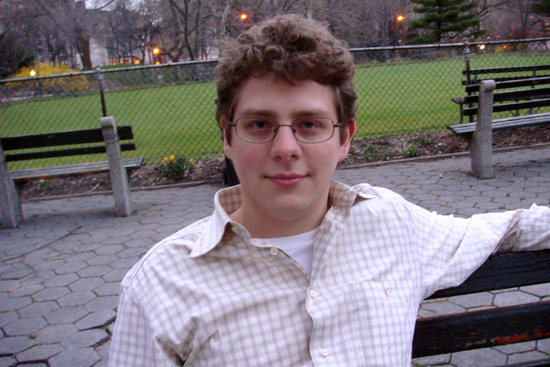Senior Named Carnegie Junior Fellow
 |
| Gregory Dubinsky 07 will work with experts in Washington DC after graduation. He was named a Carnegie Junior Fellow, the first Wesleyan has had since 1991. |
| Posted 04/17/07 |
| Gregory Dubinsky 07 will have the opportunity to work with two Russian scholars as a newly-accepted Junior Fellow at the Carnegie Endowment for International Peace, a think-tank based in Washington, DC that focuses on promoting cooperation between nations.
Dubinsky, a government and intellectual history double major, is one of only seven students in the country to receive this honor. Each year the Carnegie Endowment offers the one-year fellowships to seniors and individuals who have graduated during the past academic year. The senior applied for the program to learn more about U.S. foreign policy issues, particularly as they apply to countries and cultures where there has historically been a gap in mutual understanding. He remembers reading Samuel Huntington’s controversial article The Clash of Civilizations and wondering how countries own self-perception affect their interactions with other nations Russia was always fascinating to me in this regard because of how profoundly important and troubled its historical struggle to define itself in relation to Western civilization has been, he explains. The Carnegie applications are judged on the quality of the written essay, related academic study and/or work experience, grades, recommendations and personal interviews. Dubinsky submitted an essay on the importance of oil and gas to Russian foreign policy and its implications for Russia’s relationship with the West. This essay parallels his senior thesis, which is focused on exploring the connection between identity and foreign policy in Russian political and intellectual history in the nineteenth century and since 1991. In this study, Dubinsky wanted to find out how Russians’ sense of themselves has affected their country’s relationship to the United States and Europe, particularly as cooperation with Russia has become increasingly important to tackling the major global security issues of the day. I hope to continue in that vein at the Carnegie Endowment by trying to understand contemporary Russian politics in a deeper and more revealing historical context, he says. The atmosphere of intellectual inquiry at Wesleyan has prepared me well to ask critical questions about how cultures understand themselves and others. As a Junior Fellow, Dubinsky will provide research assistance to associates working on the Carnegie Endowments Russian/Eurasian projects. In the past, Junior Fellows have had the opportunity to conduct research for books, co-author journal articles and policy papers, participate in meetings with high-level officials, contribute to congressional testimony and organize briefings attended by scholars, activists, journalists and government officials. Hes been paired with Mark Medish, vice president for Studies on Russia, China and Eurasia and special assistant to the president during the Clinton Administration, and Jim Collins, former U.S. ambassador to Russia, senior associate and director of the Russian and Eurasian Program, and diplomat in residence. Wesleyan has not had a Junior Carnegie Fellow since 1991. Peter Rutland, chair of the College of Social Studies and professor of government, nominated Dubinsky for the Junior Fellowship and encouraged him to apply. Dubinsky is grateful to Rutland for his support and guidance. Dubinsky will begin his fellowship Aug. 1 and work full-time at the Carnegie Endowment, based in Washington DC, for one year. He will receive $2,750 per month and full benefits. After graduation, Dubinsky plans on taking a trip to the Northwest to unwind, and he hopes to start learning Mandarin this summer in New York. Meanwhile, hes excited about moving to Washington. I’m looking forward to meeting interesting people and learning more about how things get done in the capital, he says. Living in Washington should be a lot of fun and Im very thankful for this opportunity. |
| By Olivia Drake, The Wesleyan Connection editor |

